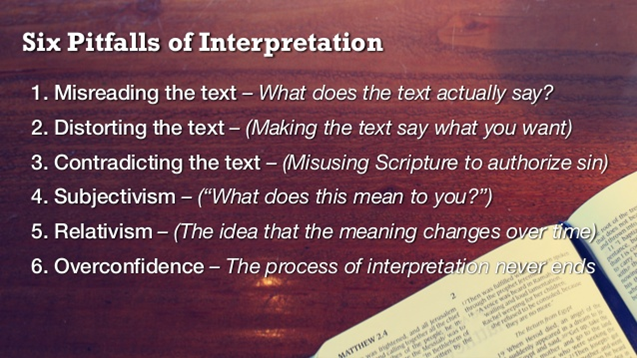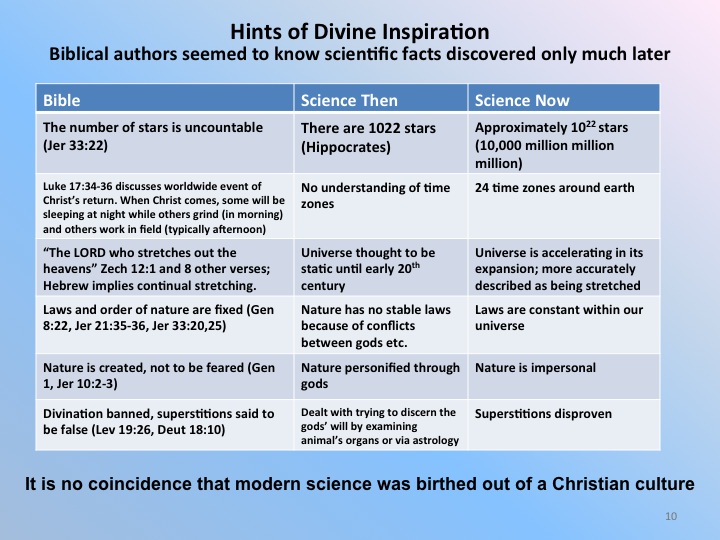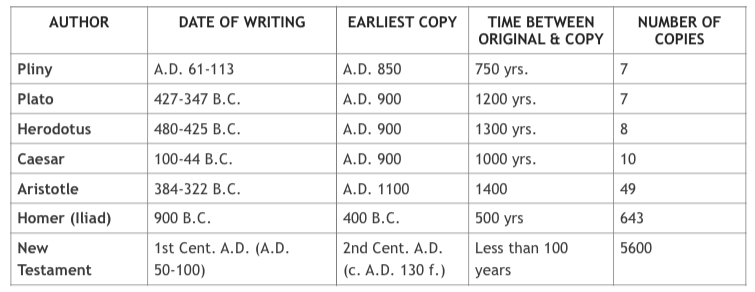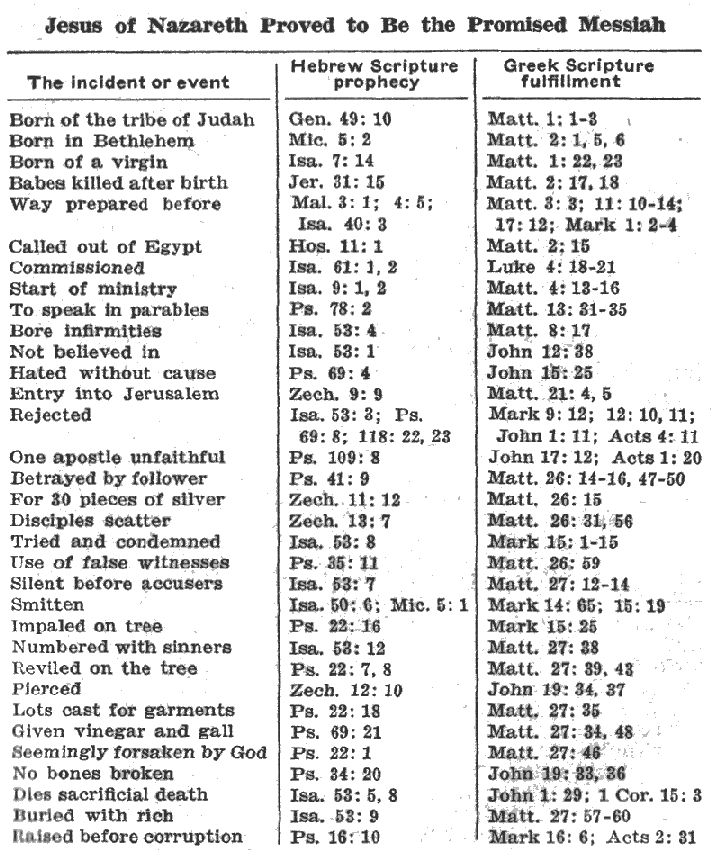Responding to the 7 major challenges to the Bible’s reliability & additional resources to support the truthfulness of the Bible.
Short Answer:
The Bible is true in everything it addresses. Despite the many attacks it has endured over the centuries, it continues to withstand the harshest challenges. The important thing is to consider each challenge separately and understand both the critique and a reasoned response by a Christian scholar.
Long Answer:
Many people wonder if the Bible is true. No other book has endured as much scrutiny from critics than the Bible. For nearly two centuries, the Christian Scriptures have endured a persistent onslaught of attacks, yet it remains the most reliable collection of ancient manuscripts in existence.
Despite the attacks, the Bible claims to be the very words of God on multiple occasions and in several ways (Psalm 18:30, Matthew 4:4, 2 Timothy 3:16-17). It’s almost as if God dares his critics to prove his words wrong and many have risen to the challenge.
In this limited space, my goal is to present the major challenges to the Bible’s reliability, briefly respond to the challenges, and provide additional links to help further your studies.
Challenge #1: The Bible Is Full Of Contradictions
The biggest challenge unbelievers level against the Bible is that “it’s full of contradictions.” So what exactly is a ‘contradiction’. Importance of Philosophy provides a good definition…
“A contradiction arises when two ideas each make the other impossible.”
So a Biblical contradiction would happen if one passage teaches one thing while another passage teaches the opposite. If there was an actual contradiction in the Bible that would be a real problem. It would make the Bible a non-coherent set of texts to an extent, so it’s crucial to address this issue.
“This God—his way is perfect; the word of the LORD proves true; he is a shield for all those who take refuge in him.” (Psalm 18:30)
It’s no secret there are many challenging parallel passages in the Bible. Infidels.org has outlined many of the challenging passages they dub “contradictions”. These include…
- Discrepancies between the creation accounts in Genesis 1 & 2.
- Differing accounts of similar stories in Jesus life from Matthew, Mark, and Luke – aka “the Synoptic Problem.”
- Apparent theological issues when comparing various passages with each other.
- And more…
There are several other reasons why potential contradictions aren’t actual contradictions. When somebody raises a supposed contradiction in the Bible, they often fail to account for…
- Inerrancy in original languages: Inerrancy (read: no errors) is only ascribed to the original manuscripts of the Bible. We only possess copies, not the original documents penned by the original authors (aka autographs).
- Incorrect context: Critics often do not understand the context of the passage they quote.
- Translation issues: Translation problems can occur when critics reference verses from old translations (ex. King James Version) but they fail to understand passages that have been clarified in newer translations.
- Unfamiliarity with idiom: Hebrew and Greek, like English, include colloquialisms that don’t make sense when translated literally. Passages can seem contradictory if you don’t understand the original idioms.
- Copyist errors: Every ancient Bible manuscript was copied by a scribe and scribes make periodic errors. This issue would affect our extant manuscripts, but not original manuscripts.
- Poor Theology: The Bible can be a complicated book. It is possible to read seemingly contradictory passages and miss the multiple layers of meaning that each passage teaches individually. Instead of a contradiction, the Bible is teaching two complementary perspectives.
Every challenging passage is unique. It’s important to review each one to compare them as fairly as possible. You may find the “contradiction” you once thought so airtight can be interpreted in a very different way. That has been my experience with every supposed Bible contradiction I have encountered.

Image credit: essentialbible.org
Challenge #2: The Original Bible Has Been Corrupted
Critics charge the original books of the Bible has been changed since the books were originally written. They claim it’s like the game of Telephone: one person wrote down a book and through a series of copies and scribal errors and the Bible we now have is very different from the original. Of so they would say.
“God is not man, that he should lie, or a son of man, that he should change his mind.
Has he said, and will he not do it? Or has he spoken, and will he not fulfill it? (Numbers 23:19)
Considering only the New Testament documents, this challenge is the weakest challenge to the authority of Scripture. The evidence is so stacked against it, it makes the other side seem dishonest whenever they make this accusation. Here’s a brief overview of why the Bible is (mostly) the same Bible the original authors composed (from Probe.org)…
- The New Testament is 99.5% pure comparing 5000+ separate documents.
- In 20,000 lines of text, only 40 are in doubt (about 400 words).
- None of the lines in doubt affect any major doctrine.
- If all the New Testament documents disappeared, the text could almost be reassembled through quotations of the early Church Fathers.
In other words, the challenge of a corrupt Bible is so fallacious it seems anyone who brings it up is either being intentionally misleading or doesn’t know what they’re talking about. GotQuestions.org sums it up well…
“There is absolutely no evidence that the Bible has been revised, edited, or tampered with in any systematic manner. The sheer volume of biblical manuscripts makes it simple to recognize any attempts to distort God’s Word. There is no major doctrine of the Bible that is put in doubt as a result of the minor differences that exist between manuscripts.”
Challenge #3: The God Of The Bible Is Immoral
This challenge of God being immoral is a more recent challenge to the Bible. In his provocatively titled God’s 12 Biggest D*** Moves in the Old Testament, the author outlines several of God’s morally questionable actions.
These include how God…
- Turned Lot’s wife into salt (Genesis 19:26)
- Killed all the first-born children in Egypt (Exodus 11:1-13:15)
- Killed people for complaining about killing them (Numbers 16:1-49)
- Commanded genocide (1 Samuel 15:2-3)
- Sent bears to kill boys taunting a prophet (2 Kings 2:23-24
These critiques against the God of the Old Testament have gathered a sympathetic hearing in recent years. Unbelievers who are unfamiliar with the storylines of the Bible cannot reconcile some of God’s actions and his commands to be holy like he is (1 Peter 1:16). So these objections help excuse people from taking the Bible seriously in other areas. Or more simply, “God is evil therefore I don’t have to listen to him.”
“This God—his way is perfect; the word of the LORD proves true.” (Psalm 18:30)
There’s an underlying assumption in this critique: that the critic understands morality perfectly. In fact, what may seem evil, might be the most merciful action if you understand every variable. And even if you don’t understand the entire situation, God’s actions could be completely just.
We simply don’t know everything.
In one instance, God’s “immoral” action actually makes sense if we are to take the rest of the Bible seriously. In the Old Testament, God commanded Israel to destroy the Canaanites (Deuteronomy 20:16-18). To Bible critics, this pronouncement is akin to “genocide” or something that Hitler might do. But critics fail to appreciate the moral situation that preceded that particular judgment.
Professor Clay Jones explains…
“The ‘new atheists’ call God’s commands to kill the Canaanites ‘genocide,’ but a closer look at the horror of the Canaanites’ sinfulness, exhibited in rampant idolatry, incest, adultery, child sacrifice, homosexuality, and bestiality, reveals that God’s reason for commanding their death was not genocide but capital punishment. After all, the Old Testament unequivocally commands that those who do any one of these things deserves to die.”
In this instance, God was being consistent with other passages. He merely used Israel to conduct executions based on gross violations of his law. Instead of sending a plague, he used Israel’s sword. It may seem harsh or retributive, but the actions align with the God of justice in the Bible. Sometimes it just takes a little more digging before we understand God’s purposes behind some of his actions. And sometimes we don’t know why God did what he did. But that is completely understandable since our knowledge is limited.

Challenge #4: The Bible Presents False Ideas About The Physical World
Scientific advancements have exploded in recent centuries. The Bible makes many potential scientific claims about the physical universe. Some of those claims have been challenged by scientists – and rightfully so. Here are some of the ideas critics say the Bible teaches…
- A flat earth because it has “four corners” (Isaiah 11:12, Revelation 7:1).
- The earth has an edge as in “ends of the earth” (Jeremiah 16:19, Acts 13:47).
- The earth is supported by pillars (Job 9:6, 1 Samuel 2:8).
- The sky is a mirror (Job 37:18).
- Illnesses and maladies are caused by demons (Matthew 12:22, Matthew 17:14-18).
In my opinion, this challenge is stronger than the previous challenges. If you read some of these passages literally, it does suggest the Bible teaches incorrect ideas about the physical world – ex. the earth is flat. However, I do not believe the authors were being literal in all of these passages for two reasons.
Firstly, the Bible is a collection of 66 books written by nearly 40 separate authors. Each author had his own writing style and many of the “false ideas about the physical world” passages are in poetic books or sections. In other words, it’s best not to interpret every passage as literal and neither would the original readers.
“Let God be true though every one were a liar.” (Romans 3:4)
A perfect example of an obvious poetic passage is Psalm 91:4: “He will cover you with his pinions, and under his wings you will find refuge.” In this passage, it is clear the Psalmist is comparing God to a mother bird in his care for us. But if the Bible teaches a coherent theology, this Psalm cannot be taken literally. Or more precisely, this passage does not teach God is a bird.
In every one of these problem passages, the context and the literary style should be properly considered before accepting the accusation that it’s communicating a false idea about the physical world. As in every challenging area of the Bible, each passage is different and should be examined separately.
Secondly, just because a theologian in church history interpreted a particular passage a certain way does not mean the Biblical reference ultimately teaches that. I have observed this challenge from critics who do not understand the difference between a Biblical doctrine and a theological opinion.
If a theologian in a bygone century taught a particular opinion at odds with modern science, that does not mean the Bible teaches the same thing. Evangelical theology does not hold teachers throughout church history to be infallible. Only the Bible is considered to be without error. Not theologians.

Image Credit: Slideshare
Challenge #5: Bible Stories Violate Known Scientific Laws
Many people disbelieve the Bible because they don’t believe in miracles. These critics can’t believe in a book that teaches things they can’t explain with current scientific theories. One such author at American Humanist said it like this…
“By claiming that supernatural beings intervene in the world, the Bible opposes the scientific principle of natural laws operating uniformly and unvaryingly. As a result, the Bible discourages a scientific approach to problems.”
In other words, many reject the Bible because it includes a talking snake (Genesis 3:1), a talking donkey (Numbers 22:28), a talking dead man in hell (Luke 16:22-31) and a man who rose from the dead (1 Corinthians 15:3-4). In the normal course of events, we don’t observe “silly stories” like that. The critic’s worldview excludes things they can’t explain because they never observed them.
Or so they would say.
“The heavens declare the glory of God, and the sky above proclaims his handiwork.” (Psalm 19:1)
The fact is, this challenge is not even consistent within their scientific naturalistic framework. Those who reject miracles in the Bible are all-too-ready to believe other miracles on which their “scientific theories” depend.
For instance, Clay Kraby at ReasonableTheology.org has rightfully pointed out The Four Miracles of Atheism:
- Getting something from nothing.
- Getting life from non-life.
- Getting order from chaos.
- Getting the immaterial from physical matter.
That is the reason I find this particular challenge to be weak. It belies the selective and inconsistent anti-supernaturalism present in the scientific community. They reject some miracles because they’re in the Bible, but accept other miracles because their peers believe them. This is pure bias, nothing more.

Image Credit: ProveTheBible.com
Challenge #6: The Bible Contains Wrong History
Another challenge that critics level against the Bible is that it contains inaccurate statements about history. Much of the Bible contains historical narrative, so there is much material to review and possibly critique. Some of those areas include…
- Creation
- Adam & Eve
- Noah’s Flood
- The Tower of Babel
- The Exodus
- The Conquest of Canaan
- The Life, Death, and Resurrection of Jesus
- The Book of Acts
Nearly every book in the Bible containing historical narrative has been challenged as not being historically accurate. Whether it’s doubting that God created the heavens and the earth as Genesis 1 & 2 teach or whether Jesus was an historical person, this line of attack is a common one.
“Sanctify them in the truth; your word is truth.” (John 17:17)
The Bible is a collection of ancient documents. As such, it can be tested with the same principles of historiography as other ancient documents. We can use the same ways to determine if Julius Caesar’s Gallic Wars is an historically reliable text as the Bible. Although some of the events in the Bible are miraculous and harder for some people to believe, the document itself can be tested for reliability in other aspects.
J Warner Wallace, cold case homicide detective and Christian apologist offers four principles for determining whether or not a document is historical.
Principle #1: Make Sure the Witnesses Were Present in the First Place
Principle #2: Try to Find Some Corroboration for the Claims of the Witnesses
Principle #3: Examine the Consistency and Accuracy of the Witnesses
Principle #4: Examine the Presence of Bias on the Part of the Witnesses
In all of these principles, the New Testament documents pass this series of internal and external tests as to whether they recorded actual events. There are other tests of authenticity for ancient documents and every one must be handled separately as in the other challenges. But there are good reasons to believe the Bible is historically accurate in everything it presents.
One of the Bible’s staunchest, recent critics has even defended one important aspect of the Bible, the historicity of Jesus. Liberal theologian Bart Ehrman said:
“This is not even an issue for scholars of antiquity…. The reason for thinking Jesus existed is because he is abundantly attested in early sources…. If you want to go where the evidence goes, I think that atheists have done themselves a disservice by jumping on the bandwagon of mythicism, because frankly, it makes you look foolish to the outside world. If that’s what you’re going to believe, you just look foolish.”

Image Credit: Chronological Bible Teaching
Challenge #7: The Bible Contains False Prophecies
“For I am God, and there is no other; I am God, and there is none like me, declaring the end from the beginning and from ancient times things not yet done.” (Isaiah 46:9-10)
One of the more curious aspects of the Bible is prophecy. Easton’s Bible Dictionary says of prophecy…
“A prophecy or prediction, was one of the functions of the prophet. It has be en defined as a “miracle of knowledge, a declaration or description or representation of something future, beyond the power of human sagacity to foresee, discern, or conjecture.”
Steven Lawson said “at the time the Bible was written 27% of the Bible was prophetic”. That’s a lot of prophecies. Some examples of fulfilled prophecies include Cyrus becoming ruler of Persia – prophesied 100 years before he took the throne.(Isaiah 44:28-45:1), Judah going into exile for 70 years (Jeremiah 29:10), and the city of Tyre being destroyed (Ezekiel 26:1-20).

Image Credit: strictlygenteel.co.uk
However, some critics point to other prophecies that have yet to be fulfilled. These were some of the examples given by one source…
- Genesis 26:4 – The Israelites would be as numerous as “the stars in the heavens.” But there are nowhere near that number of Israelites on earth.
- Isaiah 17:1 – Damascus will become “will become a heap of ruins.” But Damascus still stands to this day.
- Ezekiel 29:10-11 – God “will make the land of Egypt an utter waste and desolation” and “it shall be uninhabited forty years”. But that has never happened.
- And more…
Indeed, there are some problematic prophecies in the Bible. Scholars have been aware of these passages for centuries and these issues point to the fact that that the Bible we have is mostly the same text the original authors wrote. In other words, scribes kept the problem passages in tact despite some of the challenges – when they could have amended the text to make the Bible less problematic.
There is not enough space to cover all the issues with supposed “failed prophecies” and each passage should be reviewed separately. However, there are a few things to consider when reading Biblical prophecies.
- The Bible is sometimes hyperbolic. Like anyone who says hyperbolically “I have a ton of chores” (when chores cannot be measured in tonnage), likewise prophecies should not always to be interpreted literally.
- Prophecies do not always include a timestamp. Ex. “the city will be destroyed in 23 years.”
- Some prophecies have “split fulfillment” where one part is a prophesies of one time and the next part is fulfilled thousands of years later.
- Many prophecies contain symbolic language and should not be interpreted literally.
- Prophecies don’t have to be fulfilled (yet) to be true. All Biblical prophecies will be fulfilled at some point, but not all have been fulfilled at this point in history.
If we are to understand the way Biblical prophecy should be studied, then it’s harder to accuse the Bible of presenting failed prophecies. What may seem like a failure could be someone’s misunderstanding of the prophecy or an acknowledgment that the prophecy hasn’t been fulfilled yet.
Conclusion: Yes, The Bible Is True
There are many challenges to the truthfulness of the Bible, but the Word has stood the test of these challenges time and again. Every critique has a thoughtful response and every challenge can be met. Even if we don’t have enough information to answer all the questions (it is, after all, the word of the eternal God to fallible human beings), we can trust what we do understand.
The Bible is true.
I conclude with words of Isaac Newton, 17th and 18th century mathematician and scientist. A learned man in both science and religion in his day, Newton once wrote…
“There are more sure marks of authenticity in the Bible than in any profane history.
A Final Challenge: Be Honest
My challenge to anyone who is interested in whether the Bible is true:
Be honest.
Read the challenges that people have leveled against the Bible. Then read the thoughtful and researched responses from those who have answered those challenges. For every challenge, there is an answer. Finally, go where the evidence leads you by the power of the Holy Spirit.
For the Bible is the word of God and is true in everything it addresses (2 Timothy 3:16).
Resources
- Answers In Genesis’ Isn’t The Bible Full of Contradictions?.
- Answers to specific passages – carm.org’s: Bible Difficulties
- Textual criticism (the science of Bible texts) – Probe.org’s Are The Biblical Documents Reliable?
- God’s supposed immorality – GotQuestion.org’s – Is God a Moral Monster? Or the book by the same name from Paul Copan.
- More “atheist miracles” with Frank Turek’s and Norman Geisler’s book: I Don’t Have Enough Faith To Be An Atheist.
- The historicity of the Bible by Ken Boa: How Accurate Is The Bible?
- Reading Biblical prophecies with John F. Walvoord: Basic Considerations of Interpreting Prophecy and Walter James Taylor’s 25 Rules for Understanding Bible Prophecy.









